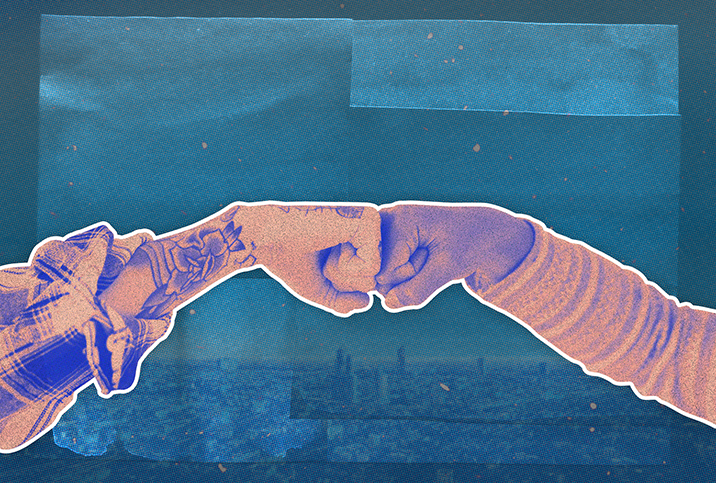Sex Workers Have Long Been 'Harm Reduction' Experts

If you've heard the words "harm reduction" before, it's likely in the context of drug policy. For decades, activists have advocated for needle exchanges and drug-testing facilities to mitigate the potential harms of drug use. These resources are often provided by drug users themselves; it's a form of mutual aid, one which is vital in a world full of governments that would rather pretend drug users don't exist than introduce measures to ensure they don't die.
The same can be said of sex work, specifically, prostitution. Despite decades of tireless activism, prostitution is still largely criminalized around the world. In countries such as Germany and the Netherlands, it's "legalized," which basically means it's still a criminal offense except in a handful of extremely specific, state-defined contexts.
In various Scandinavian countries, there's the Nordic model, which criminalizes sex buyers. However, criminalizing one-half of a transaction puts both parties at risk; reports have stated this model disproportionately leaves sex workers at risk of violence and exploitation. In places such as the United Kingdom, prostitution is technically legal, but a tangled web of discriminatory laws means sex workers can't work in brothels, solicit (a vague term) or share premises.
In the United States, the 2018 passage of SESTA-FOSTA outlawed countless vital online safety resources for sex workers. Only in New Zealand is prostitution fully decriminalized, and this law remains the model called for by activists worldwide. This legal victory, won in 2003, was earned by sex worker collectives and helped by Georgina Beyer, a Māori trans woman and former sex worker who made history in 1999 as the first transgender person in the world to be elected as a member of parliament.
As you'd imagine, this criminalization—often covert and couched in countless separate laws—puts sex workers at enormous risk of harm. According to a 2005 article in the Lancet, these harms include drug use, disease, violence, discrimination, debt, criminalization and exploitation, such as trafficking.
As a result, sex workers have become necessary experts in harm reduction—yet they often don't get credit.
Sex workers take the lead
Lauren Kiley, a sex worker and harm reduction activist based in Miami, has seen this firsthand.
"In their current iterations, especially under criminalization and current waves of legislation, the sex industries can be incredibly harmful and precarious to navigate," she explained. "Sex workers are often explicitly excluded from services such as drug rehab, domestic violence or temporary shelters. This leaves the community to take in our own."
The historical examples of this activism are global and wide-ranging. In 1970s New York, Marsha P. Johnson and Sylvia Rivera—both trans sex workers of color—established STAR House, a safe haven for unhoused trans youth, many of whom were also sex workers. Here, they provided food, shelter, community and the kind of vital, word-of-mouth safety advice often unavailable in clinical settings.
In 1989, the Thai government supplied brothel workers with huge amounts of condoms and encouraged them to practice harm reduction by ensuring their use with each client. As a result, the transmission rates for HIV and other sexually transmitted diseases dropped during the early 1990s. In a 2006 article in the Lancet, researchers praised a "community empowerment model" developed in Kolkata, India, which engaged with sex workers and relied on peer interventions to similarly reduce rates of HIV transmission.
Today, given the lack of government aid in the vast majority of countries worldwide, sex workers have to take their safety into their own hands.
"Sex workers regularly use harm reduction techniques to reduce the potential harms of trading sex," said Kate D'Adamo, a sex workers' rights activist and consultant at Reframe Health and Justice, based in Washington, D.C. "For some workers that means screening potential clients against bad date lists; for sex workers with chronic pain or disability, it might mean specializing in a type of fetish work that reduces the strain on their body from physical labor or only doing phone sex when they're having a flare-up."
D'Adamo said full-service sex workers in particular might have a friend nearby or on call to let clients know that any potential abuse could be quickly flagged. The "bad date lists" give sex workers a place to record their experiences with unpleasant or abusive clients, essentially giving other sex workers a heads-up to blacklist them.
Sex workers save each other's lives
In many countries, sharing premises as a sex worker can get you arrested for brothel-keeping. As for online screening databases, they're under constant threat thanks to laws such as SESTA-FOSTA, which decimated online safety tools almost overnight.
"Sex workers and sex worker activists have targets on their back," D'Adamo continued. "Sex workers are constantly getting kicked off social media, having their accounts blocked and losing access to the tools others take for granted, and that includes organizers and people trying to share safety information."
More generally, discussions of harm reduction often fail to acknowledge the struggles of sex workers.
"In the U.K., despite sex workers becoming increasingly visible and vocal on social media, our voices still get dismissed by those in power," said Amélie, an exotic dancer in Bristol, England, who is fighting alongside hundreds of others nationwide to save strip clubs. "We are being portrayed as the 'pimp lobby' in order to get our calls for justice and rights dismissed, for them to be able to call for an increase in criminalization."
As it stands, several councils across the United Kingdom are debating the introduction of "nil cap" policies, which would effectively shut down strip clubs. This would inevitably push dancers into street-based sex work, thus, making their jobs more dangerous. Amélie is part of United Sex Workers, a sex worker-led union branch formed in 2018, but she said there's little solidarity from other trade unions and trade unionists.
Amélie pointed out that the framework of harm reduction can—and should—be expanded to include legislation, not just mutual aid.
"Time and time again, we've said that keeping clubs open is a form of harm reduction," she explained. "The most effective form of harm reduction policy is the full decriminalization of sex work. This would allow it to be treated the same as any other form of work. Sex workers could work together for safety, not have to fear arrests and raids, have access to justice, be able to organize themselves and unionize."
In the meantime, U.K.-based, sex worker-led collectives such as SWARM (Sex Worker Advocacy and Resistance Movement) have fundraised tirelessly to pay sex workers impacted by the COVID-19 pandemic; London Sex Worker Breakfasts offer safety advice, food and safe supplies such as lube and condoms; and SWARM's Dialtone Project collects old phones and distributes them to sex workers in need.
Across the U.S., sex worker collectives such as Hacking//Hustling and Red Canary Song have online harm reduction toolkits, which advise workers how to navigate the seemingly endless waves of criminalization.
These efforts often go ignored within harm reduction activist circles.
"Sometimes, these circles are morally egregious," Kiley said. "They think sex workers deserve to experience harm."
Amélie echoed this sentiment.
"I think a lot of the work from sex work advocates gets ignored due to both disgust and misinformation," she said. "So many [discriminatory] laws and policies stem from this 'white savior' attitude; people in power frame us constantly as victims, when in reality, we're perfectly capable of knowing what's best for us and expressing it."
Essentially, effective harm reduction means looking to the knowledge and lived experience of communities which know their own needs best. It's about providing people with tools to keep themselves safe, and the legal protections to use them without fear. As Amélie neatly summarized, "Sex workers need rights, not rescue."




















